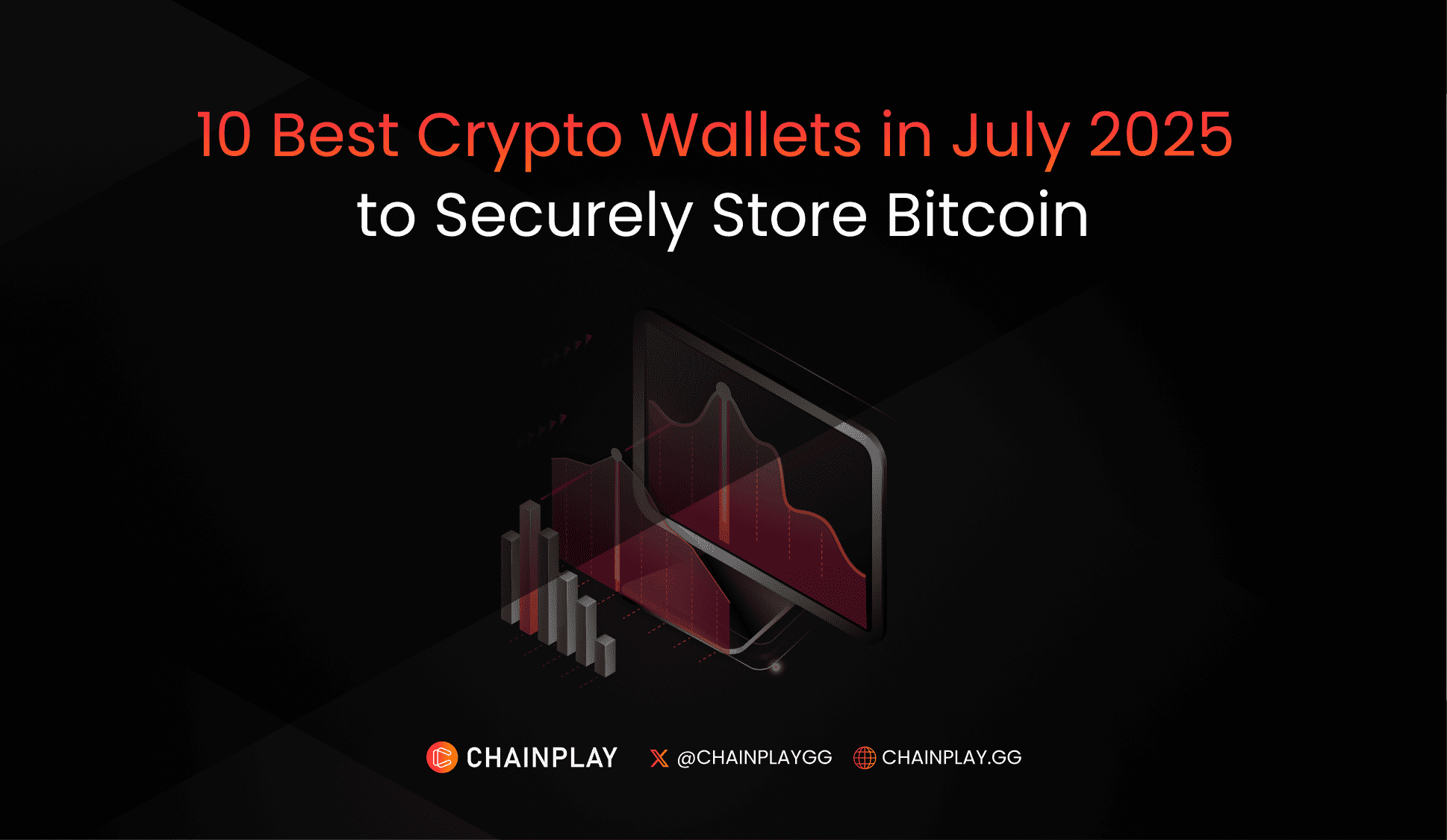News Research
10 Best Crypto Wallets in July 2025 to Securely Store Bitcoin
ChainPlay
•
3 months ago
Share :

Finding a wallet you can actually trust with your crypto isn’t as simple as it sounds. You’d think by now, with how far the space has come, there’d be a clear winner—but nope. There are tons of options, all shouting about how “secure” or “user-friendly” they are, but once you dig in, the picture gets murky.
What you really want—what most people want—is a middle ground. Something that doesn’t treat you like a hacker, but also doesn’t leave your coins hanging. Whether you’re brand new to crypto or you’ve been around since Mt. Gox, this list of 10 best crypto wallets lays out the essentials: what they’re built for, what makes them worth your attention, and, honestly, which ones don’t overcomplicate things just for the sake of looking advanced.
Top 10 Secure and Popular Crypto Wallets: ChainPlay’s Expert Picks
| Wallets | Security | Features | Fees | Customer Support |
Zengo | Keyless security, biometric recovery, MPC tech | Multi-chain, NFT support, Web3 dApps | Swap fees ~0.125%–3%, network fees apply | 24/7 live chat in-app |
Exodus | Seed phrase, closed-source | Built-in exchange, supports 260+ assets, desktop + mobile | No wallet fee, exchange spread ~1–3% | Email support, knowledge base |
Wasabi | Open-source, Tor integration, CoinJoin privacy mixing | Bitcoin-only, manual coin control | Network fees only, additional CoinJoin coordination fee | Email support, GitHub issues, documentation |
BlueWallet | Open-source, supports Lightning, seed backup | Bitcoin + Lightning, watch-only wallets | Network fees only | Email, community resources |
Trust Wallet | Seed phrase, basic encryption | Supports 70+ blockchains, staking, NFTs, dApp browser | No fees, network fees only | 24/7 chatbot and support ticket system |
MetaMask | Encrypted seed phrase, browser/mobile integration | Ethereum and EVM chains, Web3, NFTs, DeFi | Swap fee ~0.875%, gas fees apply | Online help center, limited direct support |
Trezor (Model One / Safe 5) | Hardware-based, open-source firmware | Cold storage, multisig, supports 1000+ coins | One-time device purchase, network fees only | Email support, Trezor Suite docs |
Ledger (Nano Flex / Nano X) | Secure element, cold storage, optional Bluetooth | 5500+ assets, Ledger Live app, staking, NFTs | One-time device purchase, network fees only | Online portal, Ledger Academy |
Coinbase Wallet | Local key storage, phishing alerts | Web3 access, NFTs, supports Bitcoin, Solana, and more | Swap fees vary, network fees apply | In-app support, extensive FAQs |
Electrum | Open-source, cold storage, multisig | Bitcoin-only, advanced customization, hardware integration | Network fees only, user-controlled | Forum, documentation |
Best Crypto Wallet for Beginners: Zengo (4.5/5)
Zengo is tailor-made for people just getting started with crypto. It skips the usual recovery phrase hassle—no scribbling down a string of random words you’re supposed to guard like treasure. Instead, it uses your face or fingerprint to keep things locked down. That alone makes Zengo a lot more approachable if this is your first time handling a wallet.
Zengo's Features
At its core, Zengo is built on something called MPC (multi-party computation). Rather than store all your login data in one spot, it splits the pieces between your phone and their secure servers. Even Zengo itself can’t access the whole key. That division makes it significantly harder for anyone to compromise your account.
It’s not just about security either. You can buy Bitcoin, Ethereum, and a few other coins right inside the app with a debit card or Apple Pay. Your portfolio updates in real time, and you can easily hook into other crypto apps and services without jumping through hoops.
And if you hit a snag? There’s in-app customer support, 24/7. No bots, no waiting around for email replies—just help when you need it.
Zengo's Pros
- No secret phrase to remember or lose
- Simple login with Face ID or fingerprint
- Clean, beginner-friendly design
- Supports popular coins like Bitcoin and Ethereum
- Buy crypto easily with your card or Apple Pay
- 24/7 in-app support when you need help
Zengo's Cons
- Not open to outside developers checking the code
- Missing some advanced tools for expert users
- Buying crypto through the app may cost more
- Backup uses cloud storage, which some might avoid
Best desktop wallet with built-in exchange: Exodus (4.0/5)
If you're the kind of person who wants a crypto wallet that doesn’t feel like it was built by and for engineers in a basement, Exodus might be your thing. It’s slick, it runs without a fuss, and it lets you swap coins without dragging you through yet another tedious sign-up process. Honestly, it feels like someone finally made a wallet for normal people—people who don’t want to study cryptographic key storage just to send $50 worth of Ethereum.
Exodus's Features
It works across Windows, Mac, Linux, and even mobile, which is great if you're bouncing between devices. It also supports a pretty wide list of coins—Bitcoin, Ethereum, Solana, and a swarm of ERC-20 tokens you’ve probably never heard.
It has a built-in exchange that allows you to swap your tokens easily. It’s fast, clean, and doesn’t ask for your email or your cousin’s maiden name. The app also shows your portfolio value in real-time and lets you mess with the look of the interface if you're into that sort of thing.
Bonus: it plays nice with Trezor hardware wallets, which means you can get that extra layer of security if and when you’re ready for it. Oh, and your private keys? They stay on your device, not on some mystery cloud server halfway around the world.
Exodus's Pros
- Simple setup with no registration required
- Attractive, user-friendly interface
- Built-in crypto swapping without leaving the app
- Wide range of supported coins and tokens
- Desktop and mobile support with syncing
- Trezor integration for added security
- Regular updates and strong community support
Exodus's Cons
- Not open source, so the code can’t be reviewed by the public
- No two-factor authentication
- Exchange feature has higher fees than dedicated trading platforms
- Mobile version has fewer features than the desktop app
Best Privacy-Focused Wallet: Wasabi Wallet (4.0/5)
If privacy is more than just a preference and you're serious about protecting your financial footprint, Wasabi Wallet is in a class of its own. This desktop-only Bitcoin wallet is engineered from the ground up for anonymity. It doesn't just add privacy as an extra feature—it’s the core of what Wasabi is built to do.
Wasabi’s Features
Wasabi uses CoinJoin, a method that groups multiple users’ transactions into one, making it harder for anyone watching to figure out who's sending what to whom. Wasabi runs only on desktop and is fully open source, so anyone can look into how it works.
Your private keys stay local, and there's built-in Tor integration if you want to keep your connection hidden as well. Advanced users can also take advantage of manual coin selection, labeling features, and watch-only wallets. It's built for Bitcoin and Bitcoin only—so if that’s your focus and privacy matters to you, Wasabi delivers.
Wasabi's Pros
- Strong privacy features using CoinJoin
- Built-in Tor routing for network-level anonymity
- Open source and reviewed by the Bitcoin community
- Supports manual coin control and advanced settings
- No account or registration needed
Wasabi's Cons
- Only supports Bitcoin
- Slower performance due to privacy processes
- Not beginner-friendly; has a learning curve
- Requires more time and understanding to use properly
Best wallet for Lightning Network transactions: BlueWallet (4.5/5)
If you're deep into Bitcoin and like having a bit more control over how your money moves, BlueWallet might just hit the right notes. It's clearly built with power users in mind—those who already know their way around Bitcoin and maybe even run their own node. Not exactly beginner territory, but that's the point. It’s fast, flexible, and lets you tap into the Lightning Network, which—if you’re not familiar—is sort of like the express lane for sending Bitcoin. Lower fees, faster speeds. Pretty great if you're not into waiting or overpaying.
BlueWallet's Features
This thing supports regular Bitcoin and Lightning transactions side-by-side. With Lightning, you can send small amounts instantly, skipping the slow grind of the main Bitcoin chain. It also lets you set up different wallet types—like multisig (if you're into that whole shared-access thing) or even watch-only wallets just to monitor activity without risking your funds. You can plug it into your own Bitcoin node if privacy’s your thing, or stick with third-party options if you’re not quite there yet. It even plays nice with hardware wallets like Ledger.
The interface is clean—minimal but not dumbed down. It’s available on both Android and iOS, so you're not stuck with one ecosystem.
BlueWallet's Pros
- Full support for the Lightning Network
- Advanced features like multisig and watch-only wallets
- Connects to your own node for more privacy and control
- Lets you set custom fees and manage transactions manually
- Clean mobile interface with powerful tools underneath
- Active development and strong community feedback
BlueWallet's Cons
- Not available on desktop
- Can be too complex for complete beginners
- Lightning wallet is custodial by default unless self-hosted
- Requires more setup if you want full privacy or node connection
Best mobile wallet for multiple cryptocurrencies: Trust Wallet (4.5/5)
Now if you're juggling a mix of coins like Ethereum, Solana, Bitcoin, on different blockchains, Trust Wallet is the kind of all-in-one tool you’ll appreciate. It’s backed by Binance (though it runs independently), and it doesn’t ask for your email, phone, or anything personal when you set it up. You just download, get your recovery phrase, and you’re good to go.
Trust Wallet's Features
The wallet handles over 70 blockchains, which translates into support for thousands of tokens. You also get a built-in Web3 browser for staking, swapping, trading—whatever your flavor of decentralized fun is. It lets you store NFTs too, which is handy if your wallet is more than just numbers and charts.
Private keys are stored on your device (not the cloud), so you stay in control. Just don’t lose that recovery phrase—they’re not kidding when they say they can’t help you if you forget it.
Trust Wallet's Pros
- Supports thousands of coins and tokens
- Built-in Web3 browser to access decentralized apps
- Easy to use with a clean interface
- No registration or personal data required
- Allows staking for supported coins
- Works on both Android and iOS
Trust Wallet's Cons
- You must keep your recovery phrase safe; losing it means losing access
- Not fully open source since the acquisition by Binance
- Built-in exchange may have higher fees
- No desktop version; mobile-only
Best wallet for Web3 and NFT access: MetaMask (4.0/5)
Then there’s MetaMask, which kind of became the wallet for people doing more than just holding crypto. It’s the go-to if you’re diving into Web3, NFTs, or DeFi tools like lending and liquidity pools. You’ve probably seen it mentioned in guides or on crypto Twitter. There’s a reason for that—it does a lot, especially for Ethereum-based ecosystems.
MetaMask's Features
You can install it as a browser extension or mobile app. It supports Ethereum by default, but it also plays well with chains like Polygon, Avalanche, and BNB. You can add custom tokens, switch networks, and import wallets via seed phrase or private key. Gas fees are adjustable, which helps during peak traffic times, and it has a built-in token swap tool (though many prefer external services).
What makes it powerful is how seamlessly it connects to platforms like OpenSea or Uniswap. That said, it can feel like a lot if you’re new—and there’s no in-app support, so you’re pretty much on your own to avoid phishing and scams.
MetaMask's Pros
- Connects easily to Web3 apps, NFT platforms, and DeFi tools
- Supports many Ethereum-compatible networks
- Customizable settings for gas fees and tokens
- Works on both desktop (browser extension) and mobile
- Lets you manage multiple wallets in one place
- Built-in token swapping without leaving the wallet
MetaMask's Cons
- Doesn’t support Bitcoin natively
- Can be overwhelming for beginners
- Requires careful security practices to avoid phishing
- No customer support inside the app
- Gas fees on Ethereum can be high during busy times
Best budget hardware wallet for strong security: Trezor (Model One / Safe 5) (4.5/5)
Trezor has been in the crypto game longer than most, and its reputation reflects that. If you’ve got Bitcoin—or any other major coin—and want to keep it off the grid and out of reach from hackers, this is a solid bet. The Trezor Model One and Safe 5 are hardware wallets, which means your private keys stay offline. Think of it like a digital safe that never touches the internet unless you say so.
That said, these wallets aren’t built for folks who are just figuring out what crypto is. They’re more for users who’ve been around the block and want full ownership, minus the risk.
Trezor's Features
Both devices support Bitcoin and a laundry list of other coins. You plug them into your computer or phone using USB, then manage your funds with the Trezor Suite app—super clean and functional. Every transaction has to be confirmed on the actual hardware, which means your keys never leave the device or get exposed online.
The Safe 5 comes with a touchscreen (which feels more modern and less clunky), while the Model One keeps it basic and affordable. You can also use passphrases, create hidden wallets for added privacy, and back everything up with a recovery seed—if you’re disciplined about keeping it safe.
Trezor's Pros
- Keeps your crypto completely offline
- Works with Bitcoin, Ethereum, and many other coins
- Trezor Suite software is clean and easy to use
- Recovery seed lets you restore access if the device is lost
- Supports passphrases and hidden wallets for advanced users
- Safe 5 has a full-color touchscreen for easier navigation
- Open-source firmware and strong reputation for security
Trezor's Cons
- Requires a computer or phone to use
- Not ideal for total beginners due to setup complexity
- Model One doesn’t support some newer coins like XRP
- If you lose the device and recovery seed, your funds are gone
- No built-in battery or wireless features
Best Bluetooth hardware wallet for many coins: Ledger (Nano Flex / Nano X) (4.5/5)
Ledger hits a nice balance between tight security and modern flexibility. If you’re the kind of person who wants to keep your keys locked down but still manage your coins on the go, Ledger is a strong pick.
The Nano X brings Bluetooth into the mix, so you can pair it with your phone—no cables required. The Nano Flex skips the Bluetooth but keeps things clean and straightforward.
Ledger's Features
Ledger devices store your private keys on a secure chip that stays disconnected from the internet. You use the Ledger Live app to send, receive, stake, and check your balances. It works across desktop and mobile, and honestly, it’s one of the better-designed apps in the wallet space.
The Nano X gives you more internal storage too, meaning you can manage multiple coin apps without constantly uninstalling one to use another. The Flex is more minimalist but keeps your keys just as secure. With support for over 5,000 coins and tokens, Ledger is a heavy hitter.
Ledger's Pros
- Offline storage with hardware-level protection
- Works with thousands of coins and tokens
- Bluetooth support makes mobile use easier
- Ledger Live includes staking, buying, and portfolio tools
- Can be used with Web3 and DeFi apps
- Longstanding reputation in crypto security
Ledger's Cons
- Must confirm transactions using the physical device
- Setup may take some time to understand
- Recovery phrase must be kept safe or funds can’t be recovered
- Bluetooth may not appeal to users who want a fully wired option
- Nano X is priced higher than simpler wallet models
Best wallet for Coinbase account integration: Coinbase Wallet (4.0/5)
If you're already using Coinbase and you're thinking, “Maybe I should take control of my crypto instead of leaving it all on the exchange,” Coinbase Wallet is kind of the natural next step. It’s not the same as the main Coinbase app—it’s a separate piece of software—but it plays really nicely with it. You still get that polished, beginner-friendly experience, but with the added benefit of self-custody.
Coinbase Wallet's Features
This wallet is non-custodial, meaning you’re in charge. No support line to call if you lose your private keys—it's on you. But in return, you gain actual ownership of your crypto. It supports all the big names—Ethereum, Bitcoin, Solana—and then smaller tokens. There’s also a built-in browser that lets you poke around decentralized apps (dapps), NFTs, DeFi tools, swaps—you name it.
Plus, the seamless connection with your Coinbase exchange account is a standout. No messing with long strings of wallet addresses or worrying if you copied the right one. Just a couple of taps and done. It even offers an optional cloud backup for your recovery phrase (encrypted, of course), which is great if you’re not super confident about writing it down.
Coinbase Wallet's Pros
- Works well with Coinbase exchange for quick transfers
- Supports a wide variety of coins and tokens
- Built-in browser for accessing NFTs and DeFi apps
- Simple and clean interface for mobile users
- Optional cloud backup with encryption
- Open source codebase
Coinbase Wallet's Cons
- Cloud backup isn’t ideal for those who want full offline control
- Less suited for advanced security needs or hardware integration
- Can’t directly trade on centralized exchanges from the app
- Still requires careful handling of the recovery phrase
Best fast, customizable wallet for Bitcoin only: Electrum (4.5/5)
Electrum isn’t flashy. It doesn’t try to be. But if you’re serious about Bitcoin—like, only Bitcoin—it’s hard to beat. It’s been around since 2011, which is ancient in crypto time, and it has a loyal base of power users for good reason. It’s fast, light, and doesn’t try to reinvent the wheel. No bells. No whistles. Just Bitcoin done right.
Electrum's Features
Electrum runs on both desktop and mobile, and it loads almost instantly. You can use it with your own Bitcoin node if you're that kind of user, or connect to someone else’s if you want faster access. Everything's open source, and you can tweak almost anything: which servers you connect to, what fees you pay, and how your transactions are structured.
It plays nicely with hardware wallets. You can also set up multisig protections, or run it in cold storage if you’re that security-conscious. It even supports coin control and scripting—basically, it's built for people who really know (or want to learn) what they’re doing with Bitcoin.
Electrum's Pros
- Focused solely on Bitcoin, with no distractions
- Extremely fast and lightweight software
- Lets you set custom fees and manage coins manually
- Supports hardware wallets and multisig setups
- Works offline for secure cold storage
- Open source and widely trusted by advanced users
Electrum's Cons
- Interface looks outdated and may feel technical
- Not ideal for beginners due to complexity
- Only supports Bitcoin; no altcoins or tokens
- No built-in way to buy or swap crypto
- Requires more manual setup and understanding of how Bitcoin works
How ChainPlay Picked the Best Crypto Wallets?
Choosing the right crypto wallet isn’t just about grabbing the first name that pops up in a search. It's about finding one that actually fits how you use crypto—whether you’re dipping your toes into digital assets for the first time or you’ve been in the game for years. At ChainPlay, we didn’t want to simply round up the most popular wallets. We dug deeper to find out which wallets truly serve their users in the ways that matter.
1. Security
We took a hard look at how each wallet secures user funds. That meant examining methods like encryption, biometric authentication, and advanced setups like multi-party computation. We also checked their security history for any past hacks or breaches.
2. Ease of Use
We focused on design and functionality, especially for beginners. Clear menus, simple setup processes, and easy navigation were key.
3. Features and Tools
We asked: what can this wallet actually do beyond holding coins? Built-in swaps, staking, NFT support, dApp access, hardware wallet integration—these extras add real value.
4. Platform Availability
Not everyone wants to use just their phone or just a desktop. We looked for wallets that work across multiple devices and sync seamlessly. The ability to access your funds from anywhere gives users more control.
What Is A Crypto Wallet?
A crypto wallet is a digital tool that lets you access, manage, and control your cryptocurrency. It doesn’t hold your coins in the way a physical wallet holds cash. Instead, it stores your private keys—unique codes that prove you own certain crypto assets on the blockchain. These keys are essential. Without them, you can’t send, receive, or access your funds, even though the coins themselves remain on the blockchain network.
What Are Types Of Crypto Wallets?
There are two main categories of crypto wallets: hot wallets and cold wallets.
- Hot Wallets are connected to the internet. These include mobile apps, desktop apps, and browser extensions. Examples are Trust Wallet, MetaMask, and Exodus. They’re fast, easy to use, and ideal for quick access, but they’re also more exposed to potential online threats.
- Cold Wallets are offline and include hardware wallets like Ledger and Trezor or even paper wallets. Since they’re not connected to the internet, they offer a much higher level of security. These are best for storing large amounts of crypto for long periods without frequent access.
Within those categories, wallets can also be:
- Custodial: The wallet provider controls your private keys (like wallets on exchanges).
- Non-custodial: You control your private keys, giving you full ownership of your funds.
How To Get A Crypto Wallet?
For hot wallets, just download an app. Zengo, Trust Wallet, Coinbase Wallet—all of these are available on the App Store or Google Play. You install one, walk through a few steps, and you’re in. Most will ask you to write down a “recovery phrase”—a secret list of words that acts like a backup key. Don’t lose it.
For desktop wallets like Exodus or Electrum, go to the official website and download the software or extension. Then Follow the prompts.
For cold wallets, you buy the device (from the official site), plug it in, install the wallet software, and set things up carefully.
Pro tips:
- Always use official sources. Fake wallet apps are a thing.
- Store your recovery phrase offline. Not in your Notes app.
- Turn on all the security options—PINs, biometrics, whatever’s offered. The more annoying it is to open, the better.
Conclusion: What Is The Best Crypto Wallet?
The best crypto wallet depends on what you need it for—there’s no one-size-fits-all answer. If you’re new to crypto, Zengo stands out for its simplicity and seedless security. For maximum protection and long-term storage, Ledger’s hardware wallets offer offline safety with wide asset support. Bitcoin-only users who want full control might prefer Electrum, while Coinbase Wallet is ideal for those already using the Coinbase platform and ready to take ownership of their funds. Trust Wallet remains a strong mobile option for anyone wanting access to many coins and Web3 apps. The right wallet is the one that fits your habits, goals, and level of experience.
Best Cryptocurrency Wallets: FAQs
1. What’s the difference between custodial and non-custodial wallets?
With custodial wallets, someone else has your keys, so you’re trusting them to keep things safe. With non-custodial wallets, you’re the only one holding the keys—which is great unless you lose them.
2. Do I need a hardware wallet to be secure?
Depends. If you’re just playing around with small amounts, you don’t need one. But if you’re holding thousands, then yes, it’s a smart move.
3. What happens if I lose my phone or wallet?
Your funds aren’t tied to the device—they’re tied to your keys. If you have your recovery phrase, you can restore the wallet on a new device.
4. Can I store all my crypto in one wallet?
Sometimes. Some wallets support only one coin (like Electrum, which is Bitcoin-only), while others support a wide range of coins and tokens. Always check what’s supported before you try to send anything.
5. Are mobile wallets safe to use?
Mostly, yes. As long as you do your part—use a strong password, turn on biometrics, and don’t store your recovery phrase on the same phone.
Share this article
#Other
Latest News

Bless (BLESS) To Launch on Binance Alpha on September
3 hours ago

Binance Alpha to List 0G on Sept 23 with Airdrop
6 hours ago

Binance Announces Froggie (FROGGIE) Alpha Airdrop and
21 hours ago

Are More Online Casinos Adopting Crypto As A Payment
yesterday

XOCIETY Pre-Season Playtest Runs Sept 22–29, 2025
yesterday
Top Trending Games
Related articles

Binance has launched Froggie (FROGGIE) on Binance Alpha on September 20 and a two-week trading competition between September 20 and October 4, with a reward pool of 19,880,000 FROGGIE tokens.
ChainPlay
•
21 hours ago

Binance Alpha lists 0G on Sept 23 with an airdrop. A scalable Layer-1 with AI, blockchain, and $325M backing from top funds.
ChainPlay
•
6 hours ago

Bless (BLESS) is launching on Binance Alpha on September 23 with an exclusive token airdrop for eligible users holding Alpha Points. At 09:30 on September 23, Binance will launch the BLESSUSDT perpetual futures.
ChainPlay
•
3 hours ago



